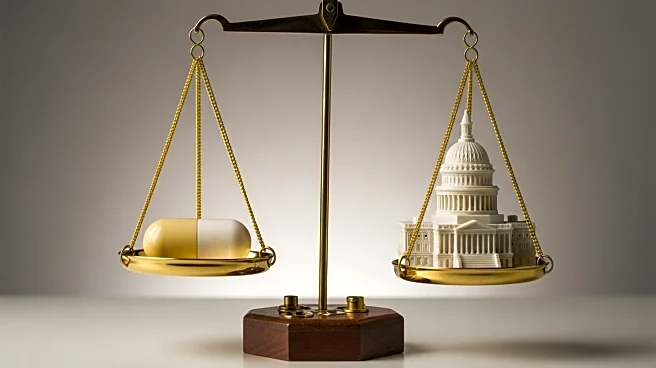What is the story about?
What's Happening?
Pfizer has announced a landmark agreement with the U.S. government aimed at reducing prescription drug costs for American patients. The agreement, reached with the Trump Administration, includes measures to align U.S. drug prices with those in other developed countries and introduces a direct purchasing platform, TrumpRx.gov, offering significant discounts on Pfizer medicines. The agreement also provides Pfizer with tariff exemptions and a stable pricing framework, enabling the company to expand its investment in U.S.-based innovation and manufacturing. Pfizer plans to focus on developing next-generation cures in areas such as cancer, obesity, vaccines, and immunology.
Why It's Important?
This agreement marks a significant step in addressing the high cost of prescription drugs in the U.S., potentially easing the financial burden on American patients. By aligning drug prices with international standards, the agreement could lead to more equitable access to essential medications. For Pfizer, the deal provides a stable environment to invest in research and development, reinforcing the U.S. as a leader in biopharmaceutical innovation. The agreement also highlights the ongoing efforts to balance drug affordability with the need to sustain innovation in the pharmaceutical industry.
What's Next?
With the agreement in place, Pfizer is set to channel additional resources into U.S. research and development, with plans to invest $70 billion in the coming years. The company will focus on delivering new treatments and expanding its manufacturing capabilities in the U.S. The success of this agreement could influence future policy decisions regarding drug pricing and healthcare reform. Stakeholders, including policymakers, healthcare providers, and patients, will be closely monitoring the implementation and impact of the agreement on drug prices and access.
Beyond the Headlines
The agreement between Pfizer and the U.S. government underscores the complex interplay between drug pricing, innovation, and public policy. While the deal aims to lower costs for patients, it also raises questions about the sustainability of pharmaceutical innovation and the role of government in regulating drug prices. The agreement may set a precedent for future negotiations between the government and pharmaceutical companies, potentially reshaping the landscape of drug pricing and access in the U.S.
















